

What is Key Result Areas? Definition of Key Result Areas, Key Result Areas Meaning. Definition: Key result areas or KRAs refer to the general metrics or parameters which the organisation has fixed for a specific role.

The term outlines the scope of the job profile, and captures almost 80%-8% of a work role. Description: Key result areas (KRAs) broadly define the job profile for the employee and enable them to have better clarity of their role. KRAs should be well-defined, quantifiable, and easy to measure. It also helps employees to align their role with that of the organisation. KRAs are broad categories or topics on which the employee has to concentrate during the year. A manager who is working in a manufacturing firm would have to focus on maintaining the budget of the department, safety of the employees, coordination with different departments, training, reporting as well as introducing new technologies to improve productivity.
Journey to Become a DevOps Engineer - Level Up Coding. Journey to DevOps Engineer is a 3 month, part-time program that is ideal for people who want to grow into DevOps while maintaining other life commitments.
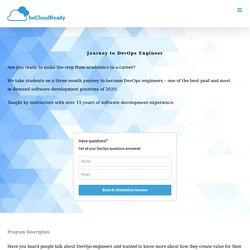
Three Phase Program: Training phaseInternship phasePlacement phase Training Phase. Systems Theory/Cybernetics. What is Cybernetics?
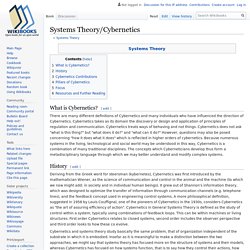
[edit] There are many different definitions of Cybernetics and many individuals who have influenced the direction of Cybernetics. Cybernetics takes as its domain the discovery or design and application of principles of regulation and communication. Cybernetics treats ways of behaving and not things. Cybernetics does not ask "what is this thing? " History[edit] Deriving from the Greek word for steersman (kybernetes), Cybernetics was first introduced by the mathematician Wiener, as the science of communication and control in the animal and the machine (to which we now might add: in society and in individual human beings). Cybernetics and systems theory study basically the same problem, that of organization independent of the substrate in which it is embodied. Cybernetics Contributions[edit] Pillars of Cybernetics[edit] Cybernetics theories tend to rest on four basic pillars: circularity, variety, process and observation. Focus[edit] Systems Thinking: What, Why, When, Where, and How?
If you’re reading The Systems Thinker®, you probably have at least a general sense of the benefits of applying systems thinking in the work-place.
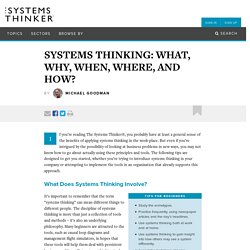
But even if you’re intrigued by the possibility of looking at business problems in new ways, you may not know how to go about actually using these principles and tools. The following tips are designed to get you started, whether you’re trying to introduce systems thinking in your company or attempting to implement the tools in an organization that already supports this approach. What Does Systems Thinking Involve?
Study the archetypes.Practice frequently, using newspaper articles and the day’s headlines.Use systems thinking both at work and at home.Use systems thinking to gain insight into how others may see a system differently.Accept the limitations of being in-experienced; it may take you a while to become skilled at using the tools. The more practice, the quicker the process! Systems Thinking: What, Why, When, Where, and How? How to Work From Home: 20 Tips From People Who Do It Successfully. Working from home is awesome ... right up until the cat throws up on your computer.

And your neighbor, who you can only assume is building a time machine, starts firing up all sorts of power tools and noisy machinery across the street. For many modern professionals, working from home every once in a while is a luxury that our respective companies afford us. But which environment actually allows us to be more productive: the home office or the office office? Quick Introduction To ProofHub. Let’s quickly simplify what ProofHub can do for you in these tough times so that it becomes easier for you to onboard your teams and clients or whoever you have to work with.

ProofHub puts every tool that teams, managers and clients need to get work done together and faster, at one place. It can help teams to be on the same page while keeping everyone in the loop in real-time. The Weekly Planning Method For People Who Totally Hate Planning. I coach CEOs, executives, HR managers, doctors, lawyers, and tech consultants–all busy people, many of whom can’t stand planning. But you won’t find me brushing up on Japanese business philosophy or fiddling with century-old planning templates in order to help my clients out. I’ve found that daily planning from a weekly action list is all it takes to keep them on track for the long haul. This “hebdomadal” model (feel free to Google that!) Read Sacha Baron Cohen's scathing attack on Facebook in full: 'greatest propaganda machine in history' In a speech last night at the Anti-Defamation League (ADL), the actor and comedian Sacha Baron Cohen attacked Facebook and other social media platforms for enabling the proliferation of hate speech and misinformation.

The speech was striking in its sincerity – Baron Cohen appeared as himself, rather than “in character” as one of his satirical personas – and its blistering tone. Describing Facebook as “the greatest propaganda machine in history”, Baron Cohen argued that the company, which does not vet political ads for truthfulness, would have allowed Hitler to run propaganda on its platform. Here is the full transcript, from his prepared remarks: One telling image: in a Brussels corridor, the EU takes back control of Brexit. As pictures go, it spoke volumes.

On Thursday evening in Brussels, Bulgaria’s permanent representative to the EU, Dimiter Tzantchev, tweeted a photograph he titled “In the corridors of the European Council art 50”. In a play of light and shadow, as if in a Golden Age painting by a modern-day Rembrandt or Frans Hals, a tight cluster of perhaps two dozen figures, some standing, some crouched, pored over a screen: senior EU officials, member state diplomats, Europe advisers to heads of government. They came from the Netherlands, Spain, Germany, Ireland, Latvia, France. The Mass Psychology of Trumpism. William butler yeats - What rough beast slouches towards Bethlehem to be born? - Literature Stack Exchange. There is a surprisingly literal interpretation to this poem.
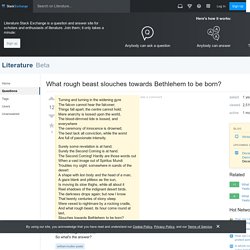
Yeats describes a sphinx-like beast arising in the desert. It is entirely possible that this is the "rough beast" to which he refers, and that the metaphorical nature of the creature is there simply to add depth to the poem. What is the best language to learn functional programming? While Everyone Is Distracted By Social Media, Successful People Double Down On An Underrated Skill. This career skill will change the way you think about reading.
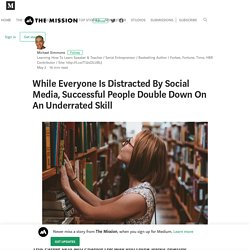
“The information we consume matters just as much as the food we put in our body. It affects our thinking, our behavior, how we understand our place in the world. YOU: Modes of Thought. Over the past five years, Robert Bramson has asked several thousand people what seems like a simple question: "How do you think about things? " "Most people find this extremely difficult to answer," says the 56-year-old organizational psychologist. "The typical response is a surprised stare, a blank look and words like, 'What do you mean, how do I think? I just think, that's all, as anybody else does.' " Gmail - Free Storage and Email from Google. Gartner Reveals Top Predictions for IT Organizations and Users in 2018 and Beyond. ORLANDO, Fla., October 3, 2017 View All Press Releases. Autonomy-mastery-purpose.